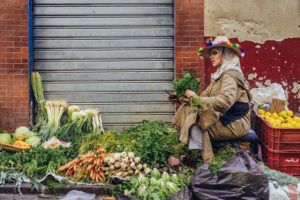Smallholder farmers has a central part in addressing poverty, hunger and undernutrition. For this reason, the International Fund for Agricultural Development (IFAD) has focused its work on smallholder farmers and poor rural people. There are 500 million small farms around the world supporting about 2 billion people and providing food for many more. The International Food Policy Research Institute (IFPRI) has contributed to IFAD’s work in establishing improved market access and resilience for smallholder farmers.
From 2009 to 2012, IFAD and IFPRI engaged in a Strategic Partnership with a focus on market access and climate change. The partnership involved applied policy research, knowledge management, and knowledge sharing between IFAD, IFPRI, and selected countries: Ghana, Morocco, Mozambique, and Viet Nam. The aim was to bolster countries’ capacity to identify and formulate innovative solutions to strengthen small farmers’ access to markets and resilience to climate change.
In Ghana, IFAD and IFPRI found that agricultural development in the country’s northern region was constrained by low public expenditure, inadequate infrastructure, and farmers’ lack of information on consumer demands. For example, half of what northern farmers produced were grains, but Ghanaian consumers buy only a small amount of grains, which limited northern farmers’ profits. Research results presented in 2011 encouraged the Government of Ghana to increase public investments in the northern region to help farmers diversify their crops, access higher-value urban markets, and increase their incomes.
For Morocco, the IFAD-IFPRI partnership developed a model to assess the impacts of free trade agreements on the agricultural sector. The resulting study, Trade Liberalization and Poverty in the Middle East and North Africa, which looked at impacts across the MENA region, showed that small-scale farmers, who were not ready to participate in the global market, would be adversely affected. In response, the Moroccan government designed policies to prepare these farmers to compete globally, including measures to enable farmers to modernize production methods and start cultivating high-value crops.
In Mozambique, IFAD and IFPRI helped build the capacity of important market intermediaries, including traders, agri-dealers, and farmer organizations, which improved farmers’ ability to market their products more profitably. In Viet Nam, IFAD and IFPRI analyzed various crops and identified rice as having the largest potential to mitigate climate change—rice accounted for 57 percent of the country’s agricultural greenhouse gas (GHG) emissions. To incorporate GHG mitigation into Viet Nam’s rice production growth strategy, IFPRI presented the Low Emissions Development Strategy as a solution, which received support from the Vietnamese government.
For more information on IFPRI's work in partnership with IFAD, please go to this brochure.



